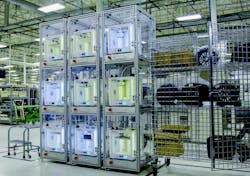Based on its recent global survey of additive manufacturing decision makers, Jabil said the adoption of 3D printing in production environments continues despite challenges associated with the cost and availability of additive materials. Jabil is a global manufacturing company with more than 250,000 employees across 100 locations in 30 countries that offers 3D printing capabilities in addition to its design, manufacturing, supply chain and product management services. The company commissioned SIS International Research to conduct this survey that received participation from 200 additive manufacturing stakeholders worldwide. Jabil has been conducting this biennial survey since 2017.
This year’s survey underscores how increased adoption of additive manufacturing is driving demand for differentiated additive materials with improved physical properties to deliver greater functionality, increased sustainability and economies of scale,” said Luke Rodgers, Jabil’s senior director of R&D for additive manufacturing.
Key findings from the survey include:
• More than half of those surveyed (55%) say that their companies’ top leadership recognize additive manufacturing as a strategic capability.
• Prototyping remains the predominant use of additive manufacturing for the majority of those surveyed, (noted by 96% of respondents), followed by design (52%) and small-scale production (27%).
• 97% currently are using 3D printing to produce functional or end-use parts.
• 96% of participants use in-house 3D printing, but outsourcing is still typical, especially with additive networks and contract manufacturers.
• Companies with more than 100 3D printers are more likely to use the technology to repair products.
• 74% of the survey participants printed at least 10,000 parts last year, while 36% printed up to 100,000 parts in that same timeframe.
• Issues with the cost and availability of materials are extremely prevalent, noted by 85% of decision-makers, increasing 31% from 2021.
• Material costs mentioned as a financial barrier to additive manufacturing rose from 18% to 79% since the 2021 survey.
• Almost all (96%) respondents said their organizations would want to use metal additive materials if certified versions were available at a reasonable cost, followed closely by plastics/polymers (88%).
Jabil continues to expand its global additive manufacturing services. Among its additive materials are Jabil PLA 3110P, a sustainable PLA (polylactic acid) powder based on NatureWorks’ Ingeo biopolymer, and Jabil PK 5000, an engineered material that reportedly delivers improved chemical resistance and resilience in comparison to general-purpose nylon materials.

